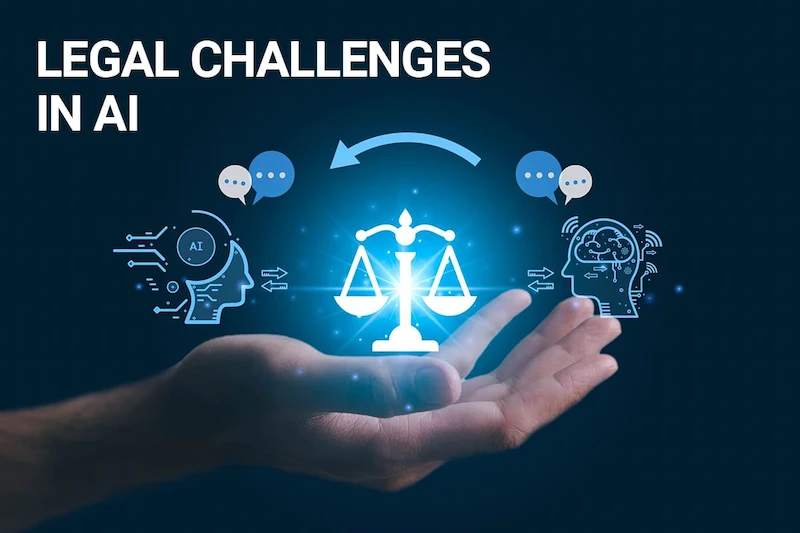Artificial intelligence (AI) is rapidly transforming the business landscape, offering companies new opportunities for automation, optimization, and innovation. However, this technological evolution also raises significant legal challenges. Issues such as liability for errors, copyright protection, and the ethical regulation of AI require businesses to navigate an evolving legal framework. This article explores the key legal issues surrounding AI and the opportunities that come with proper regulatory compliance.
Table des matières
Legal Challenges of Artificial Intelligence
1. Liability for Errors
One of the main legal questions posed by AI is responsibility in the event of errors or damages caused by an automated system. Who is liable when AI makes a faulty decision with negative consequences?
- AI developers: Should they be held accountable for malfunctions?
- End users: Can they be sued for misusing AI?
- Shared responsibility? Some regulators advocate for joint liability between AI designers and operators.
The European Union AI Act, expected in 2024, aims to establish risk categories and obligations for AI systems, providing clearer guidelines on liability (source).
Furthermore, the U.S. National AI Initiative Act emphasizes the need for responsible AI development, placing some accountability on developers and businesses integrating AI into their operations. Companies must conduct risk assessments and implement safeguards to ensure their AI systems function correctly and do not pose harm to consumers or employees.
2. Copyright Protection
With the rise of generative AI tools like ChatGPT and DALL-E, a major question arises: Who owns the rights to content created by artificial intelligence?
- Businesses using AI must ensure that generated content does not infringe copyright laws.
- Some courts have ruled that AI-generated works cannot be copyrighted due to the lack of human intervention (source).
- Companies should establish policies for validating and attributing credit to AI-generated content.
In 2023, a landmark U.S. court ruling determined that AI-generated works without human intervention cannot receive copyright protection. However, businesses are exploring hybrid models where AI assists human creativity while ensuring compliance with intellectual property laws.
For businesses using AI-generated content, it is crucial to implement human oversight mechanisms. Companies should clarify intellectual property rights in contracts with developers, employees, and third-party vendors using AI.
3. Ethical Use of AI in Business
AI can introduce biases, influence decisions in questionable ways, and lack transparency. Ethics thus becomes a crucial issue for responsible adoption.
- Algorithmic biases: Many AI systems reflect human biases present in their training data.
- Transparency and explainability: Some automated decisions are difficult to explain, raising concerns in legal disputes.
- Data protection: AI often processes vast amounts of personal data, posing compliance challenges under regulations like the GDPR.
In addition, ethical concerns extend to the use of AI in hiring and employment decisions. AI-driven recruitment tools have been found to discriminate against certain demographics, prompting regulatory scrutiny. Companies must implement fairness audits and establish clear policies to prevent AI-driven discrimination.
The European Commission’s AI Ethics Guidelines recommend that businesses implement AI that is human-centric, transparent, and accountable. To align with these recommendations, organizations should adopt bias detection frameworks and train AI models with diverse datasets.

Opportunities for Businesses
1. Enhanced Compliance as a Competitive Advantage
Companies that take a proactive approach to AI and legal challenges for businesses can turn compliance into a competitive advantage. Well-regulated AI fosters consumer trust and reduces legal risks. Organizations that implement AI with strong governance frameworks can build a reputation for ethical AI usage, which can attract both customers and investors.
Additionally, companies that comply with global AI regulations can expand into international markets with fewer legal barriers. Compliance is no longer just an obligation—it is a differentiator that signals responsibility and credibility.
Businesses can also leverage AI for regulatory compliance automation, using AI-driven tools to track legal updates, manage audits, and ensure adherence to privacy regulations such as GDPR and CCPA.
2. Innovation in Smart Contracts and Blockchain
AI combined with blockchain technology enables the automation of contracts (smart contracts), enhancing security and efficiency in business agreements. Smart contracts execute transactions automatically when predefined conditions are met, reducing the need for intermediaries and ensuring greater transparency.
For example, AI-driven contract analysis can identify risks in agreements before they are signed, minimizing legal disputes. The combination of AI and blockchain also helps businesses improve regulatory compliance by maintaining immutable audit trails of transactions and data usage.
Moreover, decentralized AI-powered legal advisory systems are emerging, where blockchain ensures the integrity of legal documents, and AI provides real-time legal insights. This could significantly reduce the cost of legal services for businesses.
3. Improved Risk Management
AI-powered predictive analytics tools help businesses anticipate legal risks and adjust their strategies accordingly, reducing potential liabilities. Companies can use AI to monitor regulatory changes in real time, ensuring ongoing compliance with evolving laws.
For instance, AI can analyze vast amounts of legal data to predict potential lawsuits, enabling businesses to mitigate risks before they escalate. Additionally, AI-powered cybersecurity tools can detect and prevent data breaches, ensuring businesses comply with strict data protection regulations.
Companies are also utilizing AI-powered fraud detection systems to minimize financial risks. By analyzing transactional data patterns, AI can flag suspicious activities and prevent fraudulent transactions before they occur.
Conclusion
AI and legal challenges for businesses present both risks and opportunities. AI offers immense potential for businesses, but it also presents major legal challenges. By adapting to evolving regulations, avoiding ethical pitfalls, and adopting responsible practices, companies can maximize AI’s opportunities while minimizing legal risks.
Businesses that proactively address AI-related legal issues will be better positioned to thrive in a digital economy. By embracing AI responsibly and ensuring compliance with emerging regulations, organizations can leverage AI’s full potential while maintaining trust and legal security.
Companies that prioritize ethical AI governance and compliance will not only reduce risks but also position themselves as leaders in responsible AI innovation, fostering long-term growth and industry trust.





